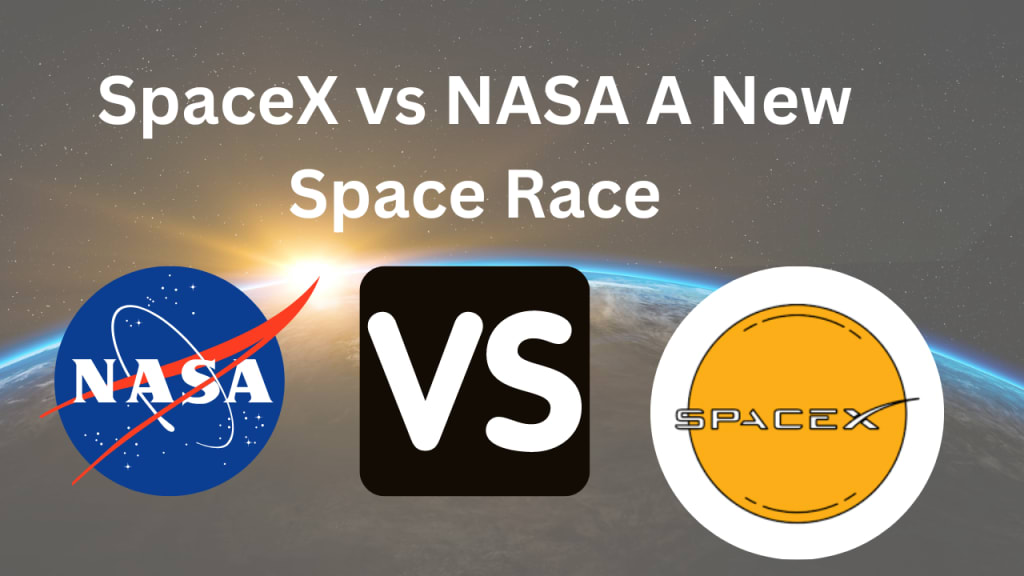SpaceX vs NASA: A New Space Race
SpaceX vs NASA

SpaceX and NASA are two of the most recognizable names in the space industry. Both organizations have made significant contributions to space exploration, with NASA having a long history of accomplishments in human spaceflight and space science, and SpaceX emerging as a major player in the commercial space industry in recent years. As these two organizations continue to push the boundaries of what is possible in space, some have begun to wonder whether a new space race is brewing between them. In this blog, we'll explore this question and examine the factors that could lead to increased competition between SpaceX and NASA.
To understand the potential for a new space race between SpaceX and NASA, it's important to first look at the history of space exploration. In the 1950s and 60s, the United States and the Soviet Union engaged in a fierce competition to see who could achieve the most impressive space-related feats. This period, known as the space race, saw both countries achieve historic milestones, including the first human spaceflight (by the Soviet Union's Yuri Gagarin) and the first manned moon landing (by the United States' Apollo 11 mission).
In the years since the space race, space exploration has become a more collaborative and international endeavor. NASA has continued to lead the way in human spaceflight, with the International Space Station (ISS) serving as a symbol of international cooperation in space. Meanwhile, private companies like SpaceX have emerged as key players in the space industry, developing new technologies and capabilities that have the potential to significantly impact the future of space exploration.
Despite this collaborative spirit, there are some signs that a new space race could be on the horizon. One of the key factors driving this possibility is the growing competition between SpaceX and NASA in the realm of human spaceflight. In recent years, SpaceX has made significant strides in developing reusable rockets and spacecraft, culminating in the successful launch of its Crew Dragon spacecraft in 2020, which carried NASA astronauts to the ISS. This marked the first time in nearly a decade that American astronauts had launched from American soil.
This success has put SpaceX in direct competition with NASA in the realm of human spaceflight, with the company now looking to expand its capabilities and potentially take on more ambitious missions. Meanwhile, NASA is working to develop its own capabilities in human spaceflight, including the Artemis program, which aims to return humans to the moon by 2024.
The potential for increased competition between SpaceX and NASA is further fueled by the growing commercialization of space. As private companies like SpaceX become more involved in space exploration, they could begin to compete directly with NASA for funding and resources. This could lead to a situation in which private companies and government agencies are vying for the same contracts and resources, leading to increased competition and potentially even conflict.
Despite these potential sources of competition, there are also many reasons to believe that SpaceX and NASA will continue to work together in a collaborative manner. Both organizations have demonstrated a commitment to advancing space exploration and pushing the boundaries of what is possible in space. They also have complementary strengths, with NASA bringing decades of experience and expertise in space science and exploration, and SpaceX bringing innovative new technologies and a focus on commercialization.
In many ways, the future of space exploration will depend on the ability of organizations like SpaceX and NASA to work together in a collaborative and productive manner. While there may be some competition between them, there are also many opportunities for cooperation and partnership. Whether a new space race emerges between these two organizations remains to be seen, but one thing is certain: the future of space exploration is likely to be shaped by a dynamic interplay between government agencies and private companies, each bringing their own unique strengths and perspectives to the table.
As we have seen, the potential for a new space race between SpaceX and NASA is a topic of much debate and speculation. On the one hand, the growing competition between the two organizations in the realm of human spaceflight, as well as the commercialization of space, could lead to increased competition and potentially even conflict. On the other hand, there are many reasons to believe that SpaceX and NASA will continue to work together in a collaborative and productive manner.
One factor that could contribute to increased competition between SpaceX and NASA is the growing interest in space exploration among other countries and private companies. As more players enter the space industry, there may be a greater emphasis on achieving impressive space-related feats and pushing the boundaries of what is possible in space. This could create a situation in which competition between organizations like SpaceX and NASA becomes more intense, as each seeks to establish itself as a leader in the field.
Another factor to consider is the potential for technological advancements to change the landscape of space exploration. As new technologies emerge, both SpaceX and NASA will need to adapt and evolve to remain at the forefront of the field. This could create new opportunities for competition, as well as new areas for collaboration and cooperation.
Despite these potential sources of competition, there are also many reasons to believe that SpaceX and NASA will continue to work together in a collaborative manner. One important factor is the shared goal of advancing space exploration and pushing the boundaries of what is possible in space. Both organizations recognize the value of exploring space, and understand that they can achieve more by working together than by competing against one another.
Another factor to consider is the complementary strengths of NASA and SpaceX. NASA brings decades of experience and expertise in space science and exploration, as well as a deep understanding of the complexities of human spaceflight. SpaceX, on the other hand, brings innovative new technologies and a focus on commercialization, as well as a willingness to take risks and push the envelope.
In many ways, the future of space exploration will depend on the ability of organizations like SpaceX and NASA to work together in a collaborative and productive manner. While there may be some competition between them, there are also many opportunities for cooperation and partnership. Whether a new space race emerges between these two organizations remains to be seen, but one thing is certain: the future of space exploration is likely to be shaped by a dynamic interplay between government agencies and private companies, each bringing their own unique strengths and perspectives to the table.
About the Creator
nizam uddin
My name is Nizam Uddin and I am thrilled to be a part of Vocal.com's community of writers. As a passionate technology enthusiast, I am excited to share my insights and opinions on the latest trends and innovations in the world of tech.






Comments
There are no comments for this story
Be the first to respond and start the conversation.